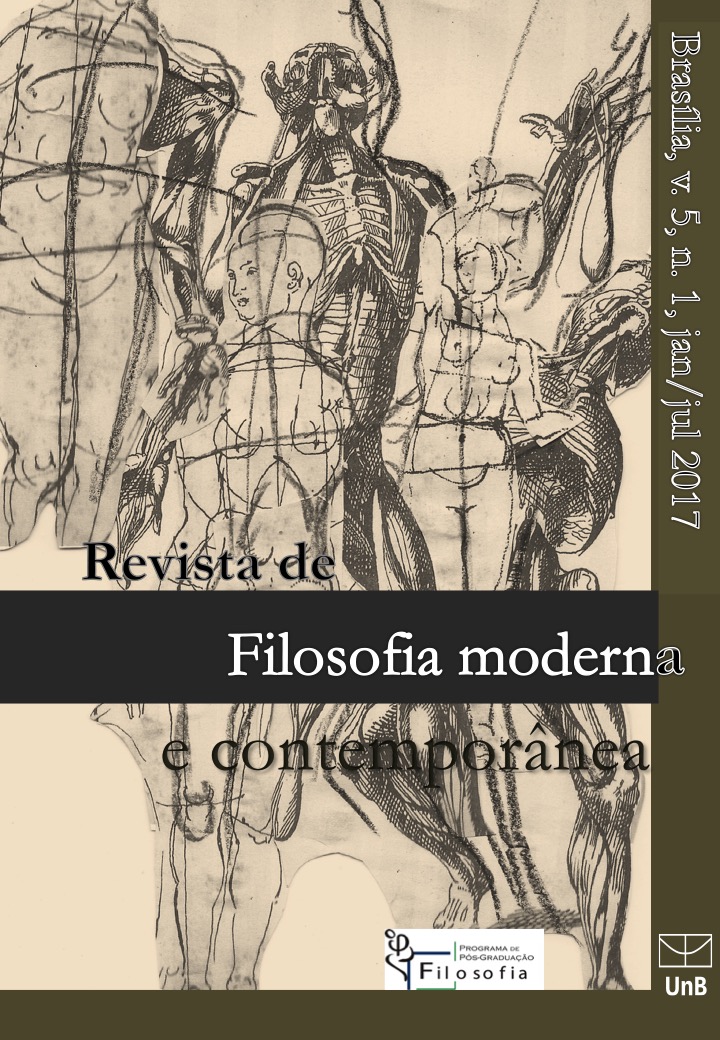Diffraction of the spirit: the approach to the concept of body without an existent body in the Second Meditation by Descartes
DOI:
https://doi.org/10.26512/rfmc.v5i1.12563Keywords:
Descartes, Cogito, MetaphysicsAbstract
Our purpose in this article is to expose the way Descartes develops in the Second Meditation an investigation of the concept of "body" without having proved that there is an existing body. It occurs, we understand, an interesting movement of the truth of the ego cogitans as pure thought towards and opposite the continuous encroachment of sensible ideas, which are fundamental in the inspection of the spirit. The proposed research strategy is guided to address the appearance of the sensitive (§ 10) with explanatory additions, to then treat the examination of the piece of wax, which puts to question the criterion of the perception of a thing as thing.
Downloads
References
DESCARTES, R.Œuvres(AT). Charles Adam et Paul Tannery (Org.). Pa-ris: Vrin, 1973-8. 11 vol.
______.Œuvres et lettres(O.L.). André Bridoux (Org.). Bélgica: Galimard, 1953.
______.Œuvres philosophiques de Descartes(O.P.D.). Ferdinand Alquié(Org.). Paris: Vrin, 1967. 3 vol.
______.Obras escolhidas. J. Guinsburg, Roberto Romano e Newton Cunha (Orgs.). Tradução de J. Guinsburg, Bento Prado Jr. et al. SãoPaulo: Perspectiva, 2010. (Textos, 24)
______.Meditações sobre filosofia primeira. Tradução de Fausto Castilho.Edição bilíngue em latim e português. Campinas, SP: Unicamp,2004. (Multilíngues de Filosofia Unicamp ”“ Série A ”“ CartesianaI)
______.O mundo(ouTratado da luz) eO homem. Apresentação, apêndi-ces, tradução e notas de César Augusto Battisti; Marisa Carneirode Oliveira; Franco Donatelli. Edição bilíngue em francês e português. Campinas, SP: Unicamp, 2009. (Multilíngues de FilosofiaUnicamp ”“ Série A ”“ Cartesiana II)
______.Obras filosóficas: Objeciones e Los princípios de la filosofia. Introdução de Étienne Gilson. Versão espanhola de Manuel de LaRevilla. Buenos Aires: El Ateneu, 1945.
______.Princípios da filosofia.Tradução de Ana Cotrim; Eloísa da GraçaBurati. 2. ed. São Paulo: Rideel, 2007. (Biblioteca Clássica)
______.Regras para a direção do espírito.Tradução de João da Gama.Lisboa: Edições 70, 1989.
GUENANCIA, P.Descartes.Tradução de Lucy Magalhães. Rio de Ja-neiro: Jorge Zahar Editor, 1991.
_________. Le corps peut-il être un sujet? In:Descartes et la question dusujet.Paris: Presses Universitaires de France, 1999.
_________.L’intelligence du sensible: essai sur le dualisme cartésien.França: Éditions Gallimard, 1998.
GUEROULT, Martial.Descartes selon l¥ordre des raisons.Paris: Aubier,1968. 2 v.
HAMELIN, Octave.El sistema de Descartes.Tradução de Amalia HaydéeRaggio. Buenos Aires: Losada, 1949.56Revista de Filosofia Moderna e Contemporânea, Brasília, v.5, n.1, Jul. 2017, p.37-55ISSN: 2317-9570
Downloads
Published
How to Cite
Issue
Section
License
Copyright for articles published in this journal is retained by the authors, with first publication rights granted to the journal. By virtue of their appearance in this open access journal, articles are free to use, with proper attribution, in educational and other non-commercial settings.


